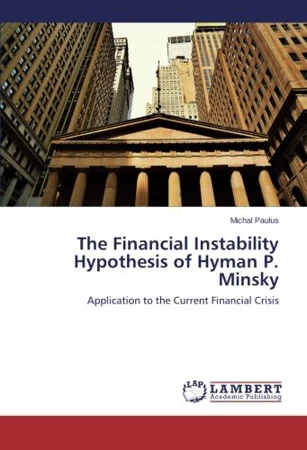The Financial Instability Hypothesis of Hyman P. Minsky – Application to the Current Financial Crisis

Blurb
The book deals with the financial instability hypothesis of Hyman P. Minsky and its application to the financial crisis of 2008/09. The first part of the work summarizes the hypothesis and mentions works elaborating the hypothesis. The second part applies the hypothesis to the current financial crisis. The whole book refers to the general discussion about the relations of Minsky’s hypothesis to the current financial crisis and to the fall of the insurance company AIG Corporation. The second part concludes that many relevant parts of Minsky’s hypothesis can be applied to the recent financial crisis but important differences of the current financial system to the system in Minsky’s times should be aware of. There are two most important differences: changes in risk management and new financial instruments. In the end, the book discusses the implications of these differences for applicability of the hypothesis on the current financial crisis. It regards the fact that the recent financial crisis is caused by rational behaviour of economic agents and not by exogenous forces as the most important lesson to learn from the financial instability hypothesis of Hyman P. Minsky.Book summary
Hyman Minsky's financial instability hypothesis assumes that it is financial markets themselves creating financial panics and market sell-offs. Inflating bubbles first, investors' herd mentality then results in those bubbles bursting violently and chaotically.
This monograph by Michal Paulus portraits the train of thought behind and eventual inception of Minsky's hypothesis, and demonstrates its persisting relevance by applicating it to the Great Recession. Paulus shows that individual rationality can have calamitous effects when aggregated to the macroeconomic level, akin to the concept of John Maynard Keynes describing the pitfalls of rational individual saving aggregated to the national level.
Comment from our editors:
Minsky's is one of the most pertinent analyses of financial markets of all time, yet his name lingers in relative obscurity and is generally recognised by economists and financial market hacks only. His insight that perfectly rational behaviour on the individual level can trigger financial crises in and of itself when enacted by a mass of people simultaneously was a milestone in economic history, and yet even today many economists tend to believe that financial markets are perfectly information efficient (the so-called Efficient Markets Hypothesis) and therefore never create crises without an exogenous trigger.
Speculative bubbles are at the centre of Minsky's analysis, demonstrating that the former are a recurring feature of markets in general, much like other hypes in socio-economics, too. But once a certain level of mass hysteria is reached (think Dutch tulips, Neuer Markt equities, or the Internet Gold Rush leading up to the year 2000), a self-reinforcing, herd-like stampede results, obliterating wealth and asset valuations in its path and thus triggering a recession in general.

